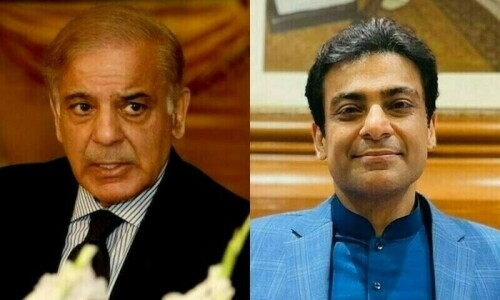Why does one go to a university? This is a question very few of us ask ourselves even though all of us should.
Is it to guarantee employment, because global trends increasingly show that no amount of education offers up such airtight assurances, especially in Pakistan, where more and more students find themselves jobless.
Is it to always have options, read ‘opportunities’? Or, is it to create opportunities and by extension employment?
There are too many answers and just as many tangents to go on here but the one very few people seem to care about is that one goes to a university to ‘learn’.
Learning has never really been high on our list of national priorities. Historically, we are not a people who ‘learn’ from our past or our present. This is because at its core, learning requires critical examination, taking responsibility and being open to change.
Learning means admitting that people, places and politics are fallible entities. That nothing is or ought to be held above scrutiny and when it is, that is a sign of intellectual cowardice and inherent apologism.
Such apologism is often indicative of the fact that we already know something is fundamentally wrong and so, we avoid closer examination on the pretext of purity, or worse, patriotism.
Also read: The sorry state of research at our universities and how to fix it
The Pakistani education system has traditionally not concerned itself with ‘learning’ or ‘thinking’ but ‘passing’ and ‘testing’ on the most cosmetic levels.
Practically speaking, this trend is understandable; education standards in the country are deplorable enough with nearly 25 million children of school going age currently out of school. So priority is given on just getting children into the system with little emphasis on addressing the flaws in the system itself.
Even though Article 25-A of the Constitution states that the State is responsible for providing free and compulsory quality education to children aged 5-16 years, there is no real scrutiny with regards to what constitutes ‘quality’ in this regard.
There has been a renewed emphasis on English education in the last decade but this trend is in no way a reflection of increased critical thinking or creativity. If anything, it has only really been an indicator of existing class divisions within an already fragmented society.
Public versus private education institutions distinguish and demarcate on the basis of English speaking and writing ability, and local languages are sidelined to the extent that many graduates from the top schools in the country cannot even count in their own language. Many students no longer consider being truly bilingual or multilingual a social advantage and many teachers don’t feel the need to counter such divisive perceptions.
The one place where one expects some critical thinking to force itself into the curriculum is at the collegiate level.
Also read: Pakistani universities climbing up international rankings: HEC chief
The HEC memo
This brings us squarely to a recent memo issued by the Higher Education Commission (HEC) Pakistan to all university vice chancellors and rectors titled, ‘Adherence to ideology and principles of Pakistan’.
The memo states that universities have a ‘great responsibility of promoting ideology and principles of Pakistan through teachings, dialogues, meetings, conferences, formal and informal gatherings and societal discourse. Demonstration of such rightful perceptions promote nationalism, dispel confusion and infuse beliefs and principles that brings harmony in a society and bolsters unity and performance.’
Pray tell, where is the evidence of this?
If anything, Pakistan’s often-mandated adherence to ‘perceptions of nationalism’ have only ever led to an extremely divided society.
Further, we – as a country – have yet to even settle on what ‘nationalism’ is!
Also read: Academia pushes back against HEC efforts to stifle debate
Do we locate nationalism in the words of MA Jinnah, because as the great defender of critical thinking and vocally challenging the status quo, statements like, “Do not forget that the armed forces are the servants of the people. You do not make national policy; it is we, the civilians, who decide these issues and it is your duty to carry out these tasks with which you are entrusted” might trouble many of our moral monitors and so-called patriots both in and out of office at present.
Traditionally Pakistani nationalism and patriotism have both been located in anti-India sentiment, this is both easy to execute and formulate, so it persists.
But do HEC stipulations mean that we should then not examine Jinnah’s words about peaceful relations with India i.e. “I sincerely hope that they (India and Pakistan relations) will be friendly and cordial. We have a great deal to do...and think that we can be of use to each other (and to) the world” or read any of his speeches before partition?
Allama Iqbal’s son Dr Javed Iqbal has responded that people often ask him about whether his father dreamed of Pakistan and he responds, “I ask them what date did he dream it up in his sleep? I have no knowledge of this but please do tell me if you know. I do, however, know of the letter my father wrote to The Times in October, 1931 in which he opposed the secession of Indian provinces”.
While the purpose of this statement may well have been just to highlight that Iqbal was not as one-dimensional in his approach as Pakistanis tend to posit, would the HEC constitute such ideas by his own son to be ‘contrary to the ideology and principles of Pakistan’ which it has accused many universities of ‘promoting’.
The memo goes on to mention that these misgiving are ‘perhaps due to the fact that program details are not reviewed and approved discretely by the Universities/DAIs’ read not effectively screened, censored and struck from the curriculum.
This ghastly document ends with an appeal, “In view of the above, we should solicit your kind support to remain very vigilant and forestall any activity that in any manner challenge the ideology and principles of Pakistan, and/or perspective of the Government of Pakistan thereof.”
This is where terrain gets even trickier, because the notice rather unsubtly equates the ideology and principles of Pakistan with its government.
Ipso facto a criticism of Pakistan’s government and its policies amounts to a criticism of the nation’s ideology itself.
Even for a country that is traditionally quite adept at censorship, whether on the individual, regional, national or cyber level – this is a bold leap.
What does the HEC’s notice mean for universities and teachers?
It is a ‘request’ that we stay where we always have stayed, with our skewed Pakistan Studies syllabus and our lack of critical thinking and reform in the classroom and outside of it.
Pakistan is not producing original thinkers, inventors and that is no fault of our students nor is it indicative of lack of talent. It is a direct result of an approach that focuses on producing grade scorers, not thinkers.
Also read: 47 As in O, A levels: Pakistani student beats world record
Many of the A-levels record breakers in the last decade have emerged from South Asian countries, students with 10-12 straight A’s. And while this is a laudable achievement and must be celebrated, the ideal student is a product of both quantitative and qualitative educational approaches. A student that can score in tests but also create, innovate and envision new ideas.
Pakistani educators need to focus on both of these tangents: We need to produce free thinkers and critical thinkers..
Actually, let’s start simpler – we need to produce ‘thinkers’.
Also read: Critical thinking: Decisions, decisions ...
Curriculum and teaching methods should be aligned not to control what students think but to allow them to know why they think what they do.
To examine and scrutinise their existing positions, as well as the ones they adopt.
The HEC clearly seems to find this to be too dangerous or lofty a goal. It seems invested in keeping students pigeonholed into the tiny pockets of provincial and partisan thinking that they have always been stuck in.
Understandably so, free thinkers are harder to control and their opinions harder to distort.












































